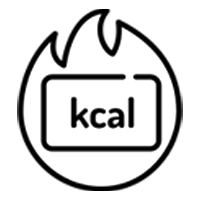Show summary Hide summary
How many calories do we burn running and jogging?

Everything you need to know about running
Wondering how many calories you burn in 30 minutes or 1 hour of running? Enter your running time and weight to get a clear estimate.
Running and jogging: A few examples of energy expenditure depending on weight and activity time.
The table below shows you how many calories you lose by running at different speeds!
Running
Light intensity
Expenditure in Kilocalories
| Weight | 15 minutes | 30 minutes | 1 hour |
|---|---|---|---|
| 40 kg | 74 | 147 | 294 |
| 50 kg | 92 | 184 | 368 |
| 60 kg | 110 | 221 | 441 |
| 70 kg | 129 | 257 | 515 |
| 80 kg | 147 | 294 | 588 |
| 90 kg | 165 | 331 | 662 |
Running speed
8km/h
Expenditure in Kilocalories
| Weight | 15 minutes | 30 minutes | 1 hour |
|---|---|---|---|
| 40 kg | 84 | 168 | 336 |
| 50 kg | 105 | 210 | 420 |
| 60 kg | 126 | 252 | 504 |
| 70 kg | 147 | 294 | 588 |
| 80 kg | 168 | 336 | 672 |
| 90 kg | 189 | 378 | 756 |
Running speed
9.5km/h
Expenditure in Kilocalories
| Weight | 15 minutes | 30 minutes | 1 hour |
|---|---|---|---|
| 40 kg | 105 | 210 | 420 |
| 50 kg | 131 | 263 | 525 |
| 60 kg | 158 | 315 | 630 |
| 70 kg | 184 | 368 | 735 |
| 80 kg | 210 | 420 | 840 |
| 90 kg | 236 | 473 | 945 |
Running speed
13km/h
Expenditure in Kilocalories
| Weight | 15 minutes | 30 minutes | 1 hour |
|---|---|---|---|
| 40 kg | 137 | 273 | 546 |
| 50 kg | 171 | 341 | 683 |
| 60 kg | 205 | 410 | 819 |
| 70 kg | 239 | 478 | 956 |
| 80 kg | 273 | 546 | 1092 |
| 90 kg | 307 | 614 | 1229 |
Running
cross-country
Kilocalorie expenditure
| Weight | 15 minutes | 30 minutes | 1 hour |
|---|---|---|---|
| 40 kg | 95 | 189 | 378 |
| 50 kg | 118 | 236 | 473 |
| 60 kg | 142 | 284 | 567 |
| 70 kg | 165 | 331 | 662 |
| 80 kg | 189 | 378 | 756 |
| 90 kg | 213 | 425 | 851 |
Jogging
on the spot
Expenditure in Kilocalories
| Weight | 15 minutes | 30 minutes | 1 hour |
|---|---|---|---|
| 40 kg | 84 | 168 | 336 |
| 50 kg | 105 | 210 | 420 |
| 60 kg | 126 | 252 | 504 |
| 70 kg | 147 | 294 | 588 |
| 80 kg | 168 | 336 | 672 |
| 90 kg | 189 | 378 | 756 |
See detailed calculations and metabolic equivalent for running
Everything you need to know about running
FIND OUT MORE ABOUT RUNNING
If there’s one sport that helps you lose weight, it’s definitely running, which will undoubtedly take pride of place on the podium of the best sports for slimming down!
Look around you! You’ll rarely see any runners who are overweight, and if you do, tell yourself that they’ve had the great idea of starting or getting back into running!
You’ll no doubt read a lot of articles proving that sport doesn’t make you lose weight, but it would be better to avoid them, because as everyone knows, if there’s one absolute truth, it’s that a sedentary lifestyle and a poor diet will make you put on weight, not the other way round. Running 2 or 3 times a week with a balanced diet that meets your metabolic needs is bound to help you get back into shape.
Why does running and jogging help you lose weight in the medium and long term?
When you go jogging, there’s a very simple mechanical reason why you naturally tap into your sugar and fat reserves. To run, just like your car, you need fuel and the better your aerobic capacity(oxygenation), the more you will draw on your fat reserves. For example, if you run at a pace of 8km/h, you’ll need 8 times more energy than if you were at rest. If you’re a beginner and you start again by alternating running and walking, you’ll expend 6 times more energy than you would at rest.
Some benefits of running and jogging
As we all know, running has many benefits for the body and mind, and here is a non-exhaustive list.
- Preserving your health and boosting your immune system
- Refining your figure and toning your body
- Lose weight
- Regain breath, stamina and cardiovascular capacity
- Improve your mind and mood by secreting endorphins
- Get a better complexion and beautiful skin
- Strengthen muscles and bones
- Increase your self-confidence by achieving your goals
Don’t forget, and this is to avoid injury, that to last and progress in running, it’s important to understand the notion of progressiveness (step by step without missing a step), variety in training (fundamental endurance, long or short outings, splits, etc.) and rest.
As you can see, there’s no point in looking for excuses any longer, just run to your doctor! Do a complete check-up and start running at a slow pace so as not to injure yourself, and you’ll gradually see the benefits of running for your body as well as your mind!
How to calculate the number of calories burned running and jogging
The result displayed is expressed in Kcal and is calculated using the MET (Metabolic Equivalent of Task). The MET for each activity is the result of statistical data and cannot therefore be interpreted as an exact calculation, but rather as an estimate that takes into account the MET value and the ratio between the time spent doing an activity and the weight of the individual.
For example: the MET value for running (at a normal pace of 8km/h) is 8. This means that a person running at this pace consumes 8 times more energy than they would at rest when jogging. This varies, of course, with the level of intensity, as we’ll see below. The more intensive the pace, the greater the energy expenditure!
MET values for different levels of running intensity
- Running with alternating walking MET = 6
- Running at a slow pace = 7
- Running (8k/h) MET = 8
- Running (9.5k/h) MET = 10
- Running (13k/h) MET = 13
- Running (cross-country) MET = 9
- Running (on site) MET = 8
Discover the detailed formula to calculate your daily energy expenditure while running
Consumption in Kcal per minute = (METs*3.5*Weight in kilos)/200
This means that for a 60kg person jogging at 8km/h for 30 minutes:
Consumption in Kcal per minute = (8*3.5*60)/200 = 8.4 Kcal/min
So for 30 minutes = 8.4*30 = 252 kcal for 30 minutes
All sports in detail!
















































